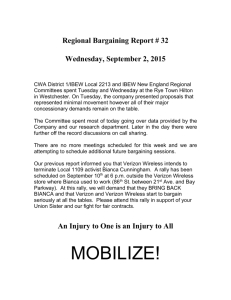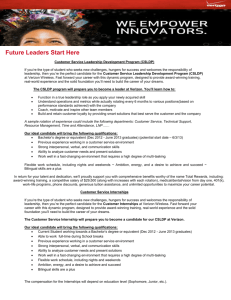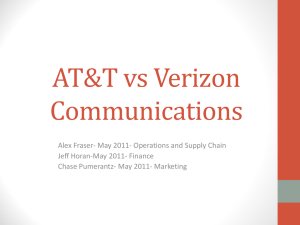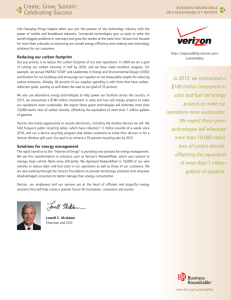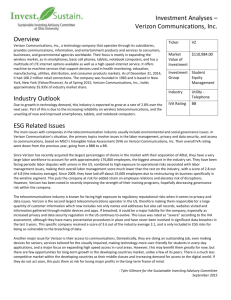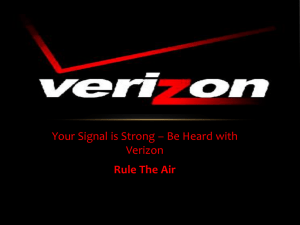Is Verizon Wireless Profit Pumping
advertisement
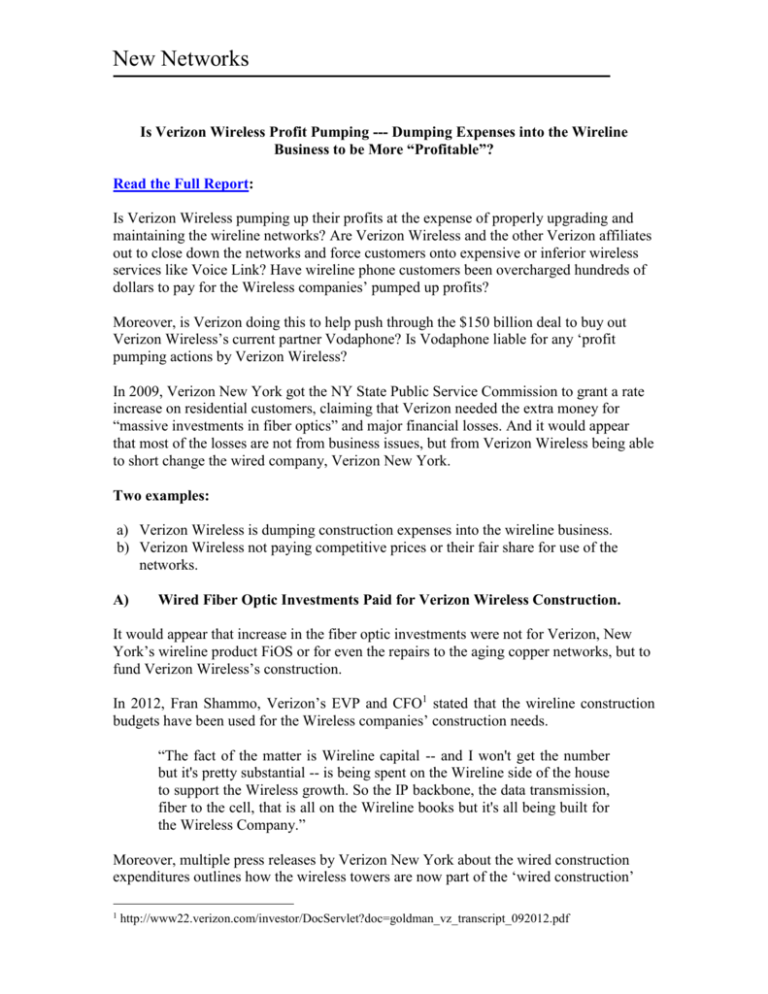
New Networks Is Verizon Wireless Profit Pumping --- Dumping Expenses into the Wireline Business to be More “Profitable”? Read the Full Report: Is Verizon Wireless pumping up their profits at the expense of properly upgrading and maintaining the wireline networks? Are Verizon Wireless and the other Verizon affiliates out to close down the networks and force customers onto expensive or inferior wireless services like Voice Link? Have wireline phone customers been overcharged hundreds of dollars to pay for the Wireless companies’ pumped up profits? Moreover, is Verizon doing this to help push through the $150 billion deal to buy out Verizon Wireless’s current partner Vodaphone? Is Vodaphone liable for any ‘profit pumping actions by Verizon Wireless? In 2009, Verizon New York got the NY State Public Service Commission to grant a rate increase on residential customers, claiming that Verizon needed the extra money for “massive investments in fiber optics” and major financial losses. And it would appear that most of the losses are not from business issues, but from Verizon Wireless being able to short change the wired company, Verizon New York. Two examples: a) Verizon Wireless is dumping construction expenses into the wireline business. b) Verizon Wireless not paying competitive prices or their fair share for use of the networks. A) Wired Fiber Optic Investments Paid for Verizon Wireless Construction. It would appear that increase in the fiber optic investments were not for Verizon, New York’s wireline product FiOS or for even the repairs to the aging copper networks, but to fund Verizon Wireless’s construction. In 2012, Fran Shammo, Verizon’s EVP and CFO1 stated that the wireline construction budgets have been used for the Wireless companies’ construction needs. “The fact of the matter is Wireline capital -- and I won't get the number but it's pretty substantial -- is being spent on the Wireline side of the house to support the Wireless growth. So the IP backbone, the data transmission, fiber to the cell, that is all on the Wireline books but it's all being built for the Wireless Company.” Moreover, multiple press releases by Verizon New York about the wired construction expenditures outlines how the wireless towers are now part of the ‘wired construction’ 1 http://www22.verizon.com/investor/DocServlet?doc=goldman_vz_transcript_092012.pdf New Networks budgets.” The 2011 summary of wired expenditures in New York outlined how the fiber optic wires to the cell towers are a wired product.2 “Accelerated deployment of fiber-optic links to wireless carriers' cell sites throughout New York as these carriers expand their infrastructure to meet ever-growing demand for wireless broadband and advanced 4G services. In 2011, Verizon deployed fiber optics to connect 1,848 of these sites in the state.” It is clear that Verizon, New York’s losses were not all from business practices but from the wireline company – and customers – being charged for wireless construction. This also reduces the revenues to the state utility for maintenance and upgrades. Moreover, Verizon has announced that has stopped the deployment of their fiber optic service, FiOS, outside the current ‘footprint’ as of 2010.3 If the company stopped doing upgrades and all residential customers got rate increases for ‘fiber optic upgrades, did customers get billed for wireless network upgrades? B) Verizon Wireless is Not Paying Competitive Prices for Access and Other Services. This exhibit supplies the payments by Verizon Wireless, AT&T and Sprint, listed in Verizon NY 2010 annual report for access services and other fees as all wireless cell towers are connected to a wire, and the wireless calls and data go over the wires. Verizon, AT&T and Sprint Wireless Payments to Verizon New York 2009-20104 (In the Millions) Verizon Wireless AT&T Sprint 2009 $ 78 $279 $119 2010 $ 95 $ 237 $104 It clearly shows that AT&T and Sprint are paying 2 to almost 4 times more than Verizon Wireless for what appears to be the same service. By not paying their fair share, besides the anti-competitive actions, it clearly lowered the wireline companies’ profits. 2 Verizon press release, February, 12, 2012 http://www.bizjournals.com/prnewswire/press_releases/2012/02/15/NY54012 3 http://online.wsj.com/article/SB10001424052702303410404575151773432729614.html 4 Source Verizon New York Inc., Consolidated Financial Statements As of December 31, 2010 and 2009.
